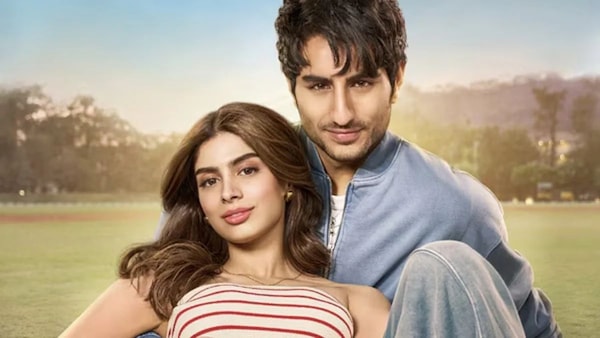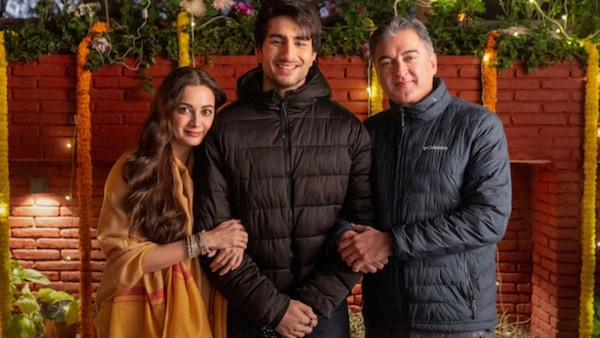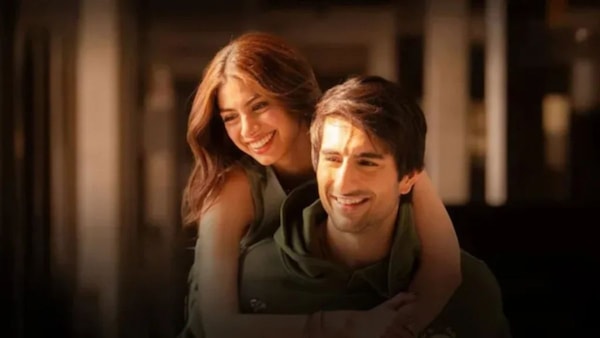Nadaaniyan: Where Are We Headed?
Shauna Gautam’s debut feature Nadaaniyan's leads are so dull that even in a ranking of Hindi cinema’s most forgettable protagonists, Pia (Khushi Kapoor) and Arjun (Ibrahim Ali Khan) wouldn’t qualify.

Promo poster for Nadaaniyan.
Last Updated: 08.00 PM, Mar 07, 2025
HISTORY IS PROOF that the most memorable Hindi films have centred on impossible deals. I will offer some examples. In Raj Kanwar’s Judaai (1997), a wife sold her husband to another woman for a briefcase of cash. In Satish Kaushik’s Hum Aapke Dil Mein Rehte Hain (1999), the two principal characters enter into a one-year marriage contract; in S. Shankar’s Nayak: The Real Hero (2001), a journalist makes a deal with a chief minister to fill in his shoes for a day. Apart from finding Anil Kapoor, the actor present in all three films, either brokering deals or being brokered in such agreements, the instances highlight the commonality of these segues.
It is, therefore, not surprising that in Nadaaniyan, the latest charity project for 'nepo-babies' from Dharmatic Entertainment, the conceit is repeated. Pia Jai Singh (Khushi Kapoor), a poor little rich girl in Delhi cracks a deal with the newest nerd-entrant in her plush school, Arjun Mehta (Ibrahim Ali Khan making his debut) to be her pretend boyfriend after she has a misunderstanding with her two best friends. If you are questioning how that is going to help, then you are focussing on the wrong problem. Arjun does not. He agrees for Rs 25,000 per week which, taking the rising inflation into account, is not the smartest deal. But then nothing about Nadaaniyan is smart— not the direction, not the filmmaking and not the writing. The protagonists of Shauna Gautam’s directorial debut are so dull that many years later, if someone draws up a ranking of the most unremarkable leads in Hindi cinema, Pia and Arjun, although deserving, will not feature even in it. They are that forgettable.
Like most Dharma productions, the most prominent fixture in the film is a school which is as distant from reality as generational wealth is to some of us. There are no dress codes and nary a syllabus. Although only for rich brats, a scholarship allows Arjun to join it. Now, let's take a beat here. Arjun is anything but poor (he is not even middle-class) but we are looking at an alternate reality here and I accept that. His father is a doctor (Jugal Hansraj) and his mother is a teacher (Dia Mirza) in the same school. Both are professionals but we see them doing only two things: eating kulfi (acceptable) and lovingly looking at Arjun (unacceptable).

They are not the only two people to whom the film refuses to lend any sense of interiority. The writing of Nadaaniyan is so candy-floss-coded that it is scared to make anyone sound half-smart. Either it is this or nobody from the writer trio (comprising Ishita Moitra, Riva Razdan Kapoor and Jehan Handa) could come up with a single intelligent line. The omission is so blatant that it is laughable. Sample this: when Arjun wants to be the captain of the debate society and is challenged by a classmate, he convinces the rest by lifting his shirt and flaunting his abs. This is also the exact moment when Piya spots him and instead of judging, pins him as her prospective fake-beau. Later, whenever there are any scenes of debating, Nadaaniyan cues to songs. My favourite, however, is the moment where Arjun, whose most strident political opinion is, “If you have to bribe at a campaigning, it is evident that you don’t have the capability [sic],” tells Piya that he spoke to her father about fiscal deficits and budgets. It is hilarious not least because it is ridiculous but because even the film knows how ridiculous it is by refusing to depict the exchange.
Hindi films (especially those from Dharma productions) have for long tried to crack the GenZ code. The dialogues are peppered with words like “red and green flags”, “cancel culture”, and most of the stories are designed to call out the traditional blind spots on which earlier films rested. Rocky Aur Rani Kii Prem Kahaani (2023) did it, Call Me Bae (2024) did it, and now Nadaaniyan does it. But the arguments have been repeated and thus so filtered out at every level that all we have now are Instagram captions masquerading as actual lines uttered by characters. When Piya talks about her conservative lawyer grandfather (Barun Chanda) who always wanted a grandson, she refers to his love as “pyaar with a tadka of patriarchy”, when she refers to herself she says, “from outside I look like the princess of entitlement and privilege”, and when she refers to her friends she says, “my whole childhood was sisterhood”. I am unsure when we took the leap of people talking like Siri.

But then again Piya and Arjun come across as cardboard cutouts rather than people who have more chemistry with blow dryers than with each other. I am all for the resurgence of rom-coms but it is impossible to feel anything for the characters, and by extension the actors, when their jawlines perform better than them. Both Khushi Kapoor and Ibrahim Ali are painful to watch. At one level Nadaaniyan gives them nothing except fits to work with (Arjun, who roams around looking at the wide sky with zero problem, promptly wears specs when he wants to look smart in class; Piya dances wearing a Manish Malhotra lehenga and seconds later changes into a hoodie when confronting her parents). But they also look so impassive like they are constantly, and only, discussing the weather.
Khan resembles a younger Saif Ali Khan with none of the charm of his father. His voice is mostly dubbed and whenever he indulges in a monologue, the camera zooms out to include reaction shots. The primary crux of Nadaaniyan is Arjun and Piya are aspiring lawyers and winning a debating competition will fund their dream college in London. Yet, the only thing I could think of both of them arguing over is their reach on Instagram. You can tell none of them has touched grass in their entire lives. And if this is the future of Hindi cinema, then the question is: where are we headed?

The bigger question then is who is having fun in the process? The writers? Maybe. The director? Perhaps. The actors? I am not sure. Me? No. Suniel Shetty? Hell yes. As Piya’s father, the actor reunites with Mahima Chaudhry two decades after Dhadkan (2000; she plays his wife) and saunters in and out of the frame with more purpose than all the characters put together. What does he do, you ask? Man is having an affair with a phone in hand and a word of appreciation in his mouth. Shetty is terrific as the loving but philandering father who looks at the big words dropping from Piya’s mouth like she has found the cure for cancer. You can call it covert condescension, blind paternal love or acting like his rent is due. Can we make a deal with him to keep sprucing up these tedious outings with his presence? Because, I am a fan.
Nadaaniyan is currently streaming on Netflix.

 Premium
Premium